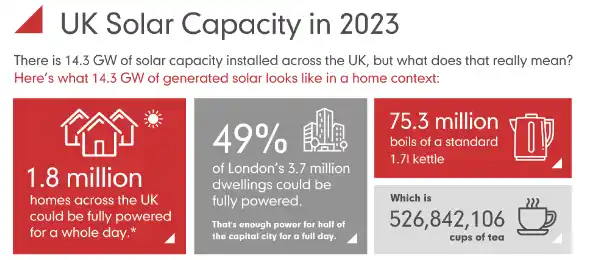The Impact of Renewable Energy on UK Business Energy Prices

Key Takeaways
- The UK has made significant progress in its use of renewable resources for its power mix.
- Various government policies and technological advancement in this field are the reason behind its growth.
- This rise in renewable energy has both positive and negative impacts on UK business energy prices.
- Transitioning to renewables for energy needs comes with its own challenges.
The United Kingdom has been a forerunner in the adoption of renewable energy, with the government setting ambitious yet practical targets to reduce carbon emissions and increase the share of renewables in the country’s energy mix.
As businesses seek to find business energy comparison prices, analyzing how their growth affects these prices becomes significant.
In this article, we will explore its impact on UK business energy prices and what this means for companies operating in the country.
The Rise of Renewable Energy in the UK
Over the past decade, the United Kingdom has made substantial progress in increasing the share of sustainable energy in its overall power mix.
In 2020, it accounted for 43% of the nation’s electricity generation, surpassing fossil fuels for the first time in history.
This became possible as a result of the combination of government policies, technological advancements, and a decline in the cost of renewable energy technologies.
Do You know?
The main source of green energy in the UK is offshore and onshore wind.
Government Policies and Support
The UK government has introduced various policies and incentives to support its development. Some of the key initiatives include:
- The Renewables Obligation (RO) scheme was established to motivate operators to generate electricity from sustainable resources.
- Feed-in Tariffs (FITs), offer financial support to small-scale renewable energy generators.
- Contracts for Difference (CfD), guarantee a minimum cost for power generated from inexhaustible sources.
- The Green Deal is a financing proposal that was created to aid homeowners and businesses invest in power efficiency and sustainable energy improvements for their properties.
- The Renewable Heat Incentive (RHI), which offers payments to participants who generate and use it to heat their buildings, is a financial incentive scheme that encourages the use of sustainable heat technologies in homes, organizations, and industries,
- Large organizations in the public and private sectors are required to participate in the Carbon Reduction Commitment (CRC) Energy Efficiency Scheme, a program that promotes the adoption of energy-efficient technologies and practices.
These policies have helped drive investment in renewable energy projects, contributing to significant development in the sector.
Technological Advancements
Technological advancements have played an influential role in making it more accessible and affordable. Solar photovoltaic (PV) panel prices, for instance, have decreased by more than 80% since 2010, making them more competitive with conventional power sources.

Similarly, advancements in wind turbine technology have led to larger, more efficient turbines, escalating the potential for wind power generation.
Decline in Renewable Energy Costs
The cost of technologies in this field has been steadily declining over the past decade, making them more competitive with traditional power sources. As a result, it has attracted enterprises and energy suppliers alike.
Knowledge BubbleAccording to the International Renewable Energy Agency (IRENA), the global weighted average cost of electricity from solar PV fell by 82% between 2010 and 2019, while the cost of onshore wind declined by 39% during the same period.
Impact on UK Business Energy Prices

This expansion has had a radical impact on the UK’s business energy prices. Various factors contribute to this, including increased competition, lower wholesale electricity costs, and the changing structure of power contracts.
Increased Competition
An eye-to-eye competition in the energy market can be seen, as more suppliers enter into the field offering sustainable energy options.
This has put downward pressure on the prices, leading to more competitive rates for organizations.
Lower Wholesale Electricity Prices
The increased share of renewables in the United Kingdom’s energy mix has contributed to lower wholesale electricity costs.
The cost of generating electricity from inexhaustible sources has fallen significantly, reducing the overall cost of electricity in the market.

As a result, businesses are able to secure more favorable power contracts, leading to lower fares.
Changing Structure of Energy Contracts
This has led to changes in the structure of power contracts offered to businesses. Many suppliers now offer “green” energy contracts that provide them with electricity sourced entirely or partially from renewable sources.
Moreover, these contracts often come at a premium, as they are willing to pay more for environmentally friendly power options.
What Does This Mean for UK Businesses?
Companies in the country are experiencing both good and bad implications.
Energy rates are becoming more favorable for businesses due to more competition and lower electricity costs. This helps them to reduce their power costs and improve their bottom line. However, since more companies are using sustainable resources, the nature of energy contracts is changing. Suppliers switch to providing green energy options at a premium price.
Organizations that are committed to reducing their environmental impact and supporting the growth of renewables, may have to pay more in the short term. But in the future, as this green technology becomes more affordable, the cost difference between green and conventional energy contracts will diminish over time.
This implies that companies will be able to afford it, helping them achieve their sustainability goals while also benefiting from competitive energy fares.
Conclusion
Due to increasing competition, lower wholesale electricity rates, and the evolving nature of power supply contracts, the expansion of renewable resources in the UK has significantly affected the organization’s energy prices.
While switching to renewables may present some difficulties, such as higher prices for green energy contracts, the general trend indicates a more sustainable and competitive energy market for UK businesses.
Enterprises should anticipate even larger benefits from this switch to clean energy sources as the cost of sustainable resource technologies keeps falling.
UK businesses may not only lessen their influence on the environment but also secure more competitive energy rates by utilizing this environment-friendly resource, ensuring a sustainable and prosperous future.










